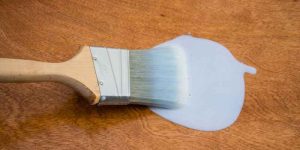Polyurethane can darken wood, especially oil-based polyurethane, while water-based polyurethane typically does not significantly darken the wood. If you’re wondering whether polyurethane will darken wood, the answer depends on the type of polyurethane you use.
Oil-based polyurethane tends to darken the wood, while water-based polyurethane usually does not significantly change its color. This distinction is important to consider when choosing a polyurethane finish for your project, as it can affect the overall appearance of the wood.
We will explore the impact of polyurethane on the color of wood and provide some tips for achieving the desired finish. So, let’s dive into the topic of whether polyurethane will darken wood.
Effects Of Polyurethane On Wood Color
When it comes to finishing wood, the choice of polyurethane can significantly impact the color of the wood. Understanding how polyurethane affects wood color is crucial for achieving the desired aesthetic outcome for your woodworking projects.
Polyurethane Darkening Wood
Polyurethane has the potential to darken the natural color of wood, creating a richer and deeper hue. This transformation can enhance the overall appearance of the wood, giving it a timeless and elegant look. When selecting a polyurethane finish, it’s essential to consider how it will interact with the wood’s existing color to achieve the desired outcome.
Polyurethane Highlighting Wood Grains
Another effect of polyurethane on wood color is its ability to highlight the wood’s natural grains and patterns. By adding depth and contrast, polyurethane can bring out the intricate details and inherent beauty of the wood, contributing to a visually stunning finish.
Types Of Polyurethane Finishes
Polyurethane finishes can darken wood, especially oil-based polyurethane which tends to yellow the wood over time. Water-based polyurethane is less likely to darken the wood and offers a clear, protective coating without significantly altering the wood’s natural color. Consider the type of polyurethane finish to achieve the desired wood tone.
When it comes to protecting and enhancing the natural beauty of wood, polyurethane finishes are a popular choice. Polyurethane is a clear, protective coating that adds durability and a glossy sheen to wood surfaces. However, not all polyurethane finishes are created equal. There are two main types of polyurethane finishes: oil-based and water-based.
Oil-based Polyurethane
Oil-based polyurethane finishes have been around for many years and are known for their rich, warm color. These finishes can darken the wood, giving it a deeper, amber appearance. It’s important to note that the degree of darkening will depend on the type of wood and the number of coats applied. Oil-based polyurethane finishes also tend to take longer to dry compared to water-based finishes.
Water-based Polyurethane
Water-based polyurethane finishes, on the other hand, are a popular choice for those who prefer a clear, natural look. Unlike oil-based polyurethane, water-based finishes do not significantly darken the wood. They provide a clear, protective coating that allows the natural beauty of the wood to shine through. Water-based polyurethane finishes also have the advantage of drying faster and emitting less odor compared to their oil-based counterparts.
It’s important to consider the type of wood and the desired end result when choosing between oil-based and water-based polyurethane finishes. While oil-based finishes can add warmth and depth to the wood, water-based finishes maintain the wood’s natural color. Ultimately, it comes down to personal preference and the style you want to achieve for your wood surfaces.
Application Techniques
Polyurethane application techniques can impact the wood’s color. Oil-based polyurethane tends to darken wood, while water-based options offer a clearer finish that does not significantly alter the wood’s natural color. It is important to consider the type of polyurethane used to achieve the desired outcome.
Surface Preparation
Before applying polyurethane, ensure the wood surface is clean, smooth, and free from dust to achieve optimal adhesion.
Brush On Vs. Wipe On Finish
Consider the application method based on the desired finish: brush on for a thicker coat or wipe on for a more subtle finish.
Importance Of Even Application
Ensuring a uniform application of polyurethane is crucial for consistent color and protection across the wood surface. Make sure to adjust the content as needed and incorporate it into the blog post on polyurethane darkening wood.
Comparison With Other Wood Finishes
Comparison With Varnish
When comparing polyurethane and varnish, polyurethane tends to darken wood over time, while varnish typically does not affect the color of the wood significantly.
Comparison With Natural Oil Finishes
In contrast to natural oil finishes, polyurethane can yellow the wood, especially oil-based options. On the other hand, natural oil finishes like linseed oil may enhance the wood’s natural color without significant darkening.
Myths And Misconceptions
There are many myths and misconceptions surrounding the topic of whether polyurethane darkens wood. In this section, we will debunk these myths and provide you with the accurate information you need.
Polyurethane Darkening Stain
One common misconception is that polyurethane darkens the wood like a stain. However, this is not true. Polyurethane is a clear finish that acts as a protective coating for the wood. It does not add any color to the wood surface.
Unlike stains, which contain pigments that penetrate into the wood fibers to add color, polyurethane does not affect the natural color of the wood. It simply enhances the wood’s natural beauty and provides a glossy or satin finish, depending on the desired sheen.
Perception Of Darkening Over Time
Another misconception is that polyurethane darkens the wood over time. While it is true that some finishes, particularly oil-based ones, may yellow or amber over time, water-based polyurethane is less likely to change the wood’s color.
Water-based polyurethane provides a clear, protective coating and is generally more resistant to yellowing compared to oil-based finishes. This makes it a great option if you want to maintain the natural color of the wood without worrying about it darkening over time.
It’s important to note that the type of wood being finished can also impact the perception of darkening. Some woods, such as pine or cherry, naturally darken or amber with age and exposure to light. In such cases, the polyurethane finish may accentuate this natural darkening process, giving the impression that the polyurethane itself is responsible for the change in color.
In conclusion, polyurethane does not darken wood like a stain, and its effect on the wood’s color over time depends on the type of finish used and the natural characteristics of the wood itself.
Selecting The Right Finish For Wood
When it comes to beautifying wood, selecting the right finish can make all the difference. One of the primary considerations when choosing a finish for wood is whether it will darken the wood. Polyurethane, a popular finish choice, may cause concern for some as they wonder whether it will darken the wood. In this guide, we discuss the factors to consider and expert recommendations regarding the impact of polyurethane on the color of wood.
Factors To Consider
When choosing a finish for wood, there are several factors to consider:
- Type of Wood: Different wood species may react differently to finishes, so it’s essential to consider the type of wood you are working with.
- Natural Color: The natural color of the wood will also influence how the finish interacts with it.
- Desired Outcome: Consider the final look you want to achieve, whether it’s a darker, richer color or to maintain the wood’s natural tone.
Expert Recommendations
Experts suggest that when using polyurethane, the type of polyurethane used is crucial. While oil-based polyurethane may yellow the wood over time, water-based polyurethane typically does not significantly darken the wood, providing a clear, protective coating without altering the wood’s color. If you are concerned about darkening the wood, opting for a water-based polyurethane may be the best choice.

Frequently Asked Questions For Will Polyurethane Darken Wood
Will Polyurethane Change Color Of Wood?
Polyurethane will darken wood to some extent, especially oil-based polyurethane which tends to yellow over time. However, water-based polyurethane is less likely to significantly change the wood’s color and will provide a clear protective coating.
What Finish Will Darken Wood?
Applying a chemical wood stain or natural alternatives like coffee or black tea can darken wood. Water-based polyurethane finishes generally do not significantly darken the wood compared to oil-based finishes. Oil-based polyurethane will darken the wood upon application.
What Polyurethane Doesn T Darken Wood?
Water-based polyurethane typically does not significantly darken wood, providing a clear, protective coating without ambering.
Does Water Based Polyurethane Make The Stain Darker?
Water-based polyurethane does not make the stain darker. It dries clear and retains the wood’s natural color.
Conclusion
Polyurethane can darken wood depending on the type of finish used. Oil-based polyurethane tends to yellow the wood over time, while water-based polyurethane typically does not significantly darken the wood. To achieve a darker finish, you may consider using a chemical wood stain or natural options like coffee or black tea.
It’s important to choose the right finish to achieve your desired results without altering the wood’s color too much.


